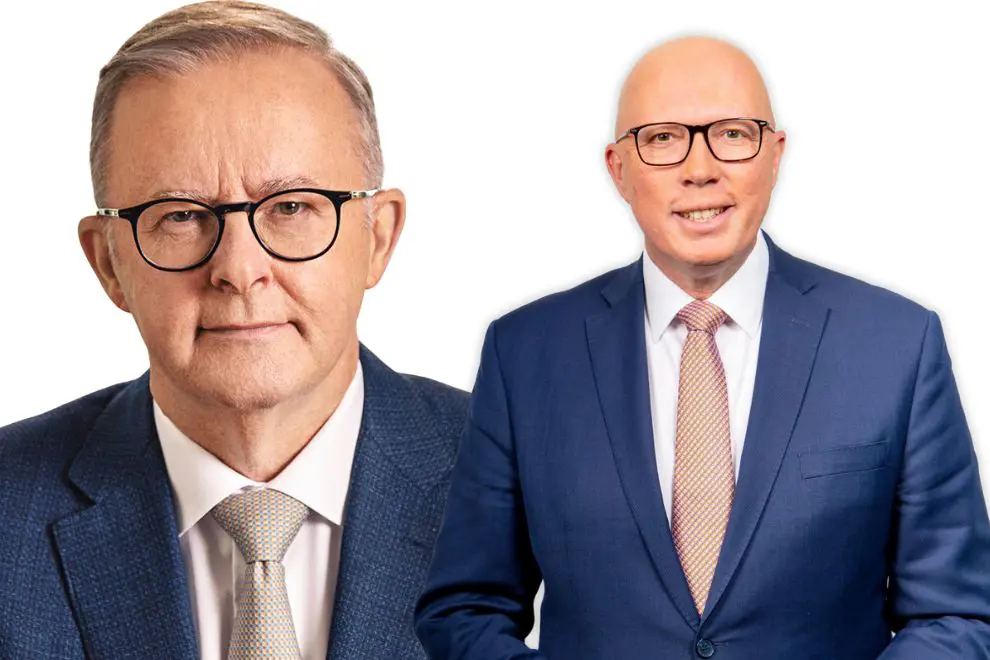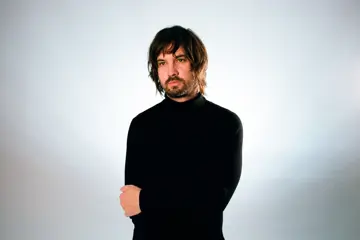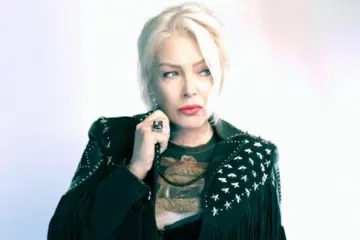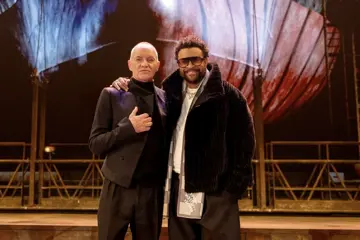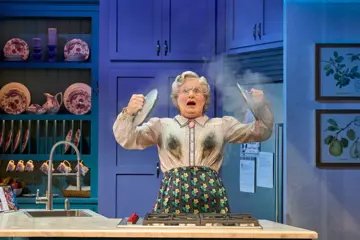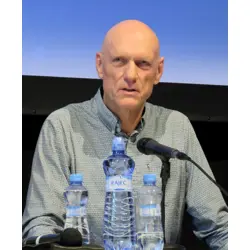 Peter Garrett
Peter GarrettCan music change the world, or swing an election?
For the first time, we have a genuine music fan in the Lodge.
Sure, Scott Morrison loved Tina Arena – he said his interest in her music was “bordering on unhealthy” – and he played April Sun In Cuba on the ukulele. But Albo actually loves music. He goes to gigs and has record players at the Lodge, Kirribilli House and in his office at Parliament House.
Albo will sometimes drop lyrics into his speeches. At the start of the last election campaign, for example, he declared: “Hey Ho, Let’s Go!”
The Prime Minister has programmed Rage, worked as DJ Albo, been an ambassador for Record Store Day, and provided cover quotes for local music books: Stuart Coupe’s Shake Some Action (“Stuart’s passion and love for music is infectious”) and Murray Engleheart’s Radio Birdman biography (“Radio Birdman live brought loyalty as strong and powerful as their music. Yeah hup!”). And Albo has pledged: “We want to support and export more Aussie music to the world.”
AC/DC was the PM’s first gig. And he loved seeing the Oils at Selina’s. He would sleep on the beach at Coogee if he missed the last bus home.
By contrast, the Liberal Party recently issued a social media post where Peter Dutton was asked, “Do you have a campaign playlist, any songs you’re listening to at the moment?”
Dutton replied: “I like a little bit of slow-paced Billy Joel … a little bit of Piano Man. A pretty eclectic list, otherwise. A bit of Luke Combs on there as well.”
And then the Liberals went from flip-flop to hip-hop. After ditching their plans to outlaw working from home, the Liberals declared that “Albo’s gotta leave” in their “diss track” Leaving Labor.
Don't miss a beat with our FREE daily newsletter
But does a love of music rock the vote? As Billy Bragg reflected in Waiting For The Great Leap Forwards: “Mixing pop and politics, he asks me what the use is?”
America has a grand – and sometimes dodgy – tradition of politicians trying to align themselves with the biggest stars of the day.
Campaigning in New Jersey in 1984, Ronald Reagan said: “America’s future rests in a thousand dreams inside your hearts. It rests in the message of hope in [the] songs of a man so many young Americans admire, New Jersey’s Bruce Springsteen. And helping you make those dreams come true is what this job of mine is all about.”
Springsteen responded on stage in Pittsburgh two days later: “The President was mentioning my name the other day, and I kinda got to wondering what his favourite album must’ve been. I don’t think it was the Nebraska album.” Reagan’s presidential opponent Walter Mondale would later add: “Bruce Springsteen may have been born to run, but he wasn’t born yesterday.”
American politics has also seen some Petty differences. Tom Petty’s I Won’t Back Down has become a go-to song for politicians.
The artist was forced to send George W. Bush a cease-and-desist letter when he used I Won’t Back Down during his 2000 presidential campaign. Petty later played the song at Al Gore’s house after Gore conceded defeat to Bush.
Twenty years later, Petty’s family sent another cease-and-desist letter, this time to President Trump. “Trump was in no way authorised to use this song that furthers a campaign that leaves too many Americans and common sense behind,” the letter stated.
“Both the late Tom Petty and his family firmly stand against racism and discrimination of any kind. Tom Petty would never want a song of his used for a campaign of hate. He liked to bring people together.”
When Joe Biden beat Trump in 2020, he played I Won’t Back Down as part of his victory speech. Petty’s family said they were “touched to see Tom included on such an important night in America”.
In the US, there is a long list of artists who have been Trumped and have demanded that the President stop using their music at his events, including ABBA, Adele, Aerosmith, a-ha, Andrew Lloyd Webber and The Animals – and that’s just the acts starting with A.
In Australia, the story of music and politics has been a little less tumultuous, but it’s still a wild ride.
Strap yourself in. As we head to the polls, here’s a look at those crazy times when music and politics have intersected.
It’s Time … for a great song
Aussie political songs really got started with Whitlam’s classic It’s Time in 1972. Led by the fine vocals of Alison MacCallum, the cast included Little Pattie, Col Joye, Bert Newton, Jack Thompson, Barry Crocker, Judy Stone, Jacki Weaver, Brian Henderson and Tony Barber.
The song helped Gough surge to power after 23 years of conservative rule. Gough provided unprecedented support to Australia’s arts sector and started Triple J. He also became the first Prime Minister to quote a local rock band when he said, “Ego is not a dirty word.” And, of course, Gough would inspire the name of Tim Freedman’s multi-platinum band, The Whitlams.
The Liberals light up
As Midnight Oil would later reflect, Gough was tough till he hit the rough. In 1975, after the Dismissal, he fought a bitterly contested election against Malcolm Fraser. After the success of It’s Time in 1972, the Liberal Party decided to unveil a song of their own – Turn On The Lights, written by Mike “Up There Cazaly” Brady and sung by Renée Geyer.
“I had never experienced anything like the publicity furore which broke when Turn On The Lights went to air,” Mike Brady recalls. “Renée was booed at her concerts. She made an extraordinary statement to the media that she didn’t know it was a song for the Liberal Party. Give me a break! Ray Evans [her then manager] and Renée knew very well the client was Malcolm Fraser.”
I am the egg man
When The Beatles came to Australia in 1964, they were greeted like heroes … except in Brisbane, where they were pelted with eggs. The Fab Four was furious, demanding that the culprits come forward and meet them “face to face” at their hotel, which, funnily enough, was called Lennon’s.
Forty years later, Bob Katter, the member for Kennedy in north Queensland, outed himself as one of the egg-throwers, revealing it was a university prank. The maverick MP – affectionately known as the “Mad Katter” – is the longest-serving member of the House of Representatives, having been elected in 1993.
Paul McCartney explained their encounter at the band’s Brisbane hotel.
“We had a bit of a chat with them – more of a debate, really – and we all ended up friends. We asked them why they threw the eggs, and they said they were sick of hearing our records on the radio. So we told them to throw eggs at the radio stations. They said they were sick of the kids screaming at us, too, and we asked if they were game enough to throw eggs at the kids.
“But we finally made them see that by throwing eggs at us they were starting a trend. And they apologised for that.”
Clive V Twisted Sister
At the 2019 Australian election, Clive Palmer thought he would rework Twisted Sister’s 1984 hit We’re Not Gonna Take It.
Palmer turned it into “Australia ain’t gonna cop it”.
Twisted Sister’s Dee Snider was not happy, so he took Palmer to court. The big-spending Aussie billionaire claimed that he wrote the lyrics and the melody was lifted from O Come, All Ye Faithful.
The Federal Court ordered Palmer to pay $1.5 million in damages. Snider tweeted: “It’s over, baby! WE WON BIG!!”
In 2022, Snider issued a statement: “ATTENTION QANON, MAGAT FASCISTS: Every time you sing We’re Not Gonna Take It remember it was written by a cross-dressing, libtard, tree-hugging half-Jew who HATES everything you stand for. It was you and people like you that inspired every angry word of that song! So F**K OFF!”
Holy Shitfight
The Tasmanian Liberal Party used Hunters & Collectors’ anthem Holy Grail for their election launch in 2002. The band was not happy.
“We are disgusted by the appropriation of our much-loved anthem by a political party that we utterly despise,” Mark Seymour said. “We would like to make it known to the people of Tasmania that we are opposed to everything that the Liberal Party stand for.”
Their minds were always closed
In 2017, the Liberal Party’s then-Energy Minister Josh Frydenberg made a speech to promote the government’s soon-to-be-dead “national energy guarantee”.
“More than 30 years ago, Jimmy Barnes came to Port Kembla to make the film clip for Working Class Man,” Frydenberg said. “Today, the Prime Minister [Malcolm Turnbull] has come to Port Kembla to create jobs for Australia’s working-class men and women.”
Barnesy shot back: “Hey Josh Frydenberg, don’t use my name or my songs to sell your shitty policies. You don’t represent me.”
The Aussie legend also fired up when far-right group Reclaim Australia played Khe Sanh at their rallies. “If you look at my family, you can see we are a multicultural family,” Barnesy pointed out. “It has come to my attention that certain groups of people have been using my voice, my songs as their anthems at rallies.
“None of these people represent me, and I do not support them.
“I only want to say the Australia I belong to and love is a tolerant Australia. A place that is open and giving. It is a place that embraces all sorts of different people. In fact, it is made stronger by the diversity of its people.”
Try and understand it
John Farnham didn’t write You’re The Voice, but he’s very protective of the song. “Anyone can sing that song if they want to,” he wrote in his autobiography The Voice Inside. “I don’t have any control of it. But to use my recording of it commercially, as an ad or something like that, I won’t let that happen.
“The only time I allowed it to be used like that was for the Indigenous Voice to Parliament referendum. When I was approached, I said yes immediately, because in my mind really, what’s it going to hurt? How does letting a group of Aboriginal and Torres Strait Islander representatives offering advice on government laws and policies that directly affect them hurt non-Indigenous people?
“I mean, it’s not going to cost anybody anything. I only wish more people had voted yes.”
Poison Ivy
A little-told story: John Farnham’s manager, Glenn Wheatley, nearly switched to federal politics. In 1989, John Howard approached Wheatley, wanting him to run for the seat of Isaacs.
Howard suggested that Wheatley would be the Arts and Communications Minister if the Liberals formed government. “I was flattered and just about ready to cross the line and commit.”
But Wheatley was having major business problems trying to build an upmarket nightclub in Melbourne called The Ivy, so he decided to pull the pin on his prospective political career. “It was a sad day because I couldn’t make a decision based on what I really wanted to do but on what I had to do,” he later reflected. “The Ivy had put paid to any future I could have had in politics.”
Fun fact: The seat earmarked for Wheatley is now held by Labor’s Mark Dreyfus, the son of noted Aussie composer George Dreyfus, who wrote the iconic theme to the ABC TV series Rush, a Top 5 hit on the pop charts in 1974.
PG 4 PM
I once asked Mark Seymour if he thought Peter Garrett would make a good Prime Minister. He replied: “For sure, absolutely. I don’t doubt it for a moment. I’m a big fan of Peter Garrett, a really big fan. Peter’s there to do good work; he’s there for the right reasons… I want him to go all the way.”
When Midnight Oil were inducted into the ARIA Hall of Fame in 2006, Silverchair performed Don’t Wanna Be The One, and Daniel Johns spray-painted “PG 4 PM” on the stage wall.
Peter Garrett didn’t quite go all the way, but he did become a minister in the Rudd and Gillard governments, serving nine years in parliament.
His 2004 election came 20 years after his first political tilt when he ran for the Senate for the Nuclear Disarmament Party.
What a Guy
Peter Garrett wasn’t the first chart-topping pop star to enter parliament. The Seekers’ Athol Guy – a great mate of prominent Liberal Andrew Peacock – was a Liberal MP for the Victorian seat of Gisborne from 1971 to 1979.
Though they were on opposite sides of the political fence, Gough Whitlam spotted Athol Guy at a campaign event when he was running for PM in 1972. “Come over here, Guy,” Gough ordered. “Let’s get photographed together and make each other famous!”
Back to Basics
In 1998, Redgum’s John Schumann took on Alexander Downer in the South Australian seat of Mayo, taking the sitting member to preferences. Schumann later told me he considered running for the Senate with his good buddy Shane Howard.
“We thought about a joint ticket,” he revealed. “You can have union hacks and lawyers, which is essentially what the parliament comprises, so we thought, wouldn’t it be interesting to have some poets and philosophers?”
Other musicians who plotted political careers include country star James Blundell, who ran as a Senate candidate for Katter’s Australian Party in 2013, and CDB’s Gary Pinto, who ran as a Family First candidate at the 2006 Victorian state election.
Angry Anderson ran for the National Party for the federal seat of Throsby (now known as Whitlam) at the 2013 election, under his real name of Gary Anderson. He received 10 per cent of the vote.
Go-Betweens drummer Lindy Morrison ran for the Democrats against Malcolm Turnbull at the 2004 federal election.
And Gotye’s band, The Basics, formed an official party, The Basics Rock’n’Roll Party, to contest the 2014 Victorian state election. Band members Kris Schroeder and Tim Heath unsuccessfully ran for the Northern Metropolitan Region. As The Age noted, it became “just some party that voters never got to know”.
Come Saturday night, I let my ramrod rock
Occasionally, politicians have got involved in the music business. Prime Minister Paul Keating famously managed Sydney band The Ramrods in the ’60s, saying he took them “from nowhere to obscurity”. They released two singles: Since You Broke My Heart and You Should Have Held On.
By the time he became PM, Keating preferred classical music to rock. But he genuinely loves music, saying: “Music, for a mind, is like an electric current for an electric motor. Once the current comes and the magnetic impulses turn it … it’s like that when the music comes into your mind, and you start thinking about other things. Suddenly you think, ‘We can do this, we can do that’, if you let the music carry you along.”
Fun fact: The Ramrods keyboards player Gary Moberley became a successful session musician in the UK, playing with The Sweet, Sigue Sigue Sputnik, Terence Trent D’Arby, ABC, the Bee Gees and Elton John. He played on Prefab Sprout’s 1988 hit Cars and Girls.
Please don’t vote for me
Tex Perkins is a rock god. But can you see him as a politician? At the Victorian state election in 2014, Tex actually ran for the seat of Albert Park. And like Cleaver Greene in Rake, his pitch was: Don’t Vote For Me.
Tex’s brief political foray was the brainchild of St Kilda councillor and rock photographer Serge Thomann. They had only one policy – Save The Palais. But when the Labor Party pledged to preserve the historic venue, Tex’s candidacy was redundant. The only problem was… Tex was already on the ballot.
“I kept campaigning right up until the election, telling people NOT to vote for me, and they’d say, ‘What a unique, refreshing approach, I’m voting for you.’ It was a total Catch-22. For a little while, I was sweating with the idea that I might actually win.”
Tex voted for the Greens. But he ended up receiving 1614 votes, 4.41 per cent of the count – more than the Family First and Sex Party candidates.
Tex was compared to Peter Garrett and Bono – “I gotta admit that hurt”. So, is his political career now over? “I played that card,” he says. “It was once and only.” But then he adds, mischievously, “But you never know, I could be back.”
Tex is not afraid of the occasional political statement. During the ABC’s New Year’s Eve show in 2019, he flipped the bird to Scott Morrison.
Howard’s way
John Howard didn’t appear to be a big music fan. He claimed to like Bob Dylan – but for his music and not his lyrics. Which is a curious thing to say.
Frenzal Rhomb didn’t dig John Howard. At the Big Day Out, they smashed John Howard piñatas to pieces. And in 2004, the band’s guitarist Lindsay McDougall organised a compilation album called Rock Against Howard, featuring tracks from a stack of Aussie acts, including Something For Kate, Bodyjar, David Bridie, Even, The Anyones and TISM.
The album also revealed that the then leader of the Australian Democrats Andrew Bartlett had been a member of an ’80s Brisbane band called Too Green For Summer. He later became an announcer on 4ZZZ, presenting a show called Bartzzz In The Belfry.
News Corp columnist Andrew Bolt gave the Rock Against Howard album a rave review, saying it was proof that the Left “is festering in flesh-melting reason-rotting hate”.
Storm warning
In 2002, Robert Doyle, the leader of the Liberal Party in Victoria, used Boom Crash Opera’s Dancing In The Storm to launch the party’s election campaign.
The party had cleverly edited the song, leaving out the opening lines – “Lying in the dark, I know you are awake/ I will not give in, I will not give in/ Pulling faces and admitting not a thing” – and also omitting the song’s conclusion: “Honestly, my foot is always in my mouth/ Still the words come out, the words come out – not the truth, but I have nothing to confess.”
The party preferred to focus on the rousing chorus: “Here we go, here we go for one more turn.”
Edits or not, the band was not happy. They said they were not asked for permission to use the song. And if they had, they would have said no.
In 1993, the Liberal Party did ask Boom Crash Opera if they could use Bettadaze for their federal campaign. “We said, not on your nelly,” Pete Farnan reveals.
“I really wouldn’t want to help the Liberal Party.”

